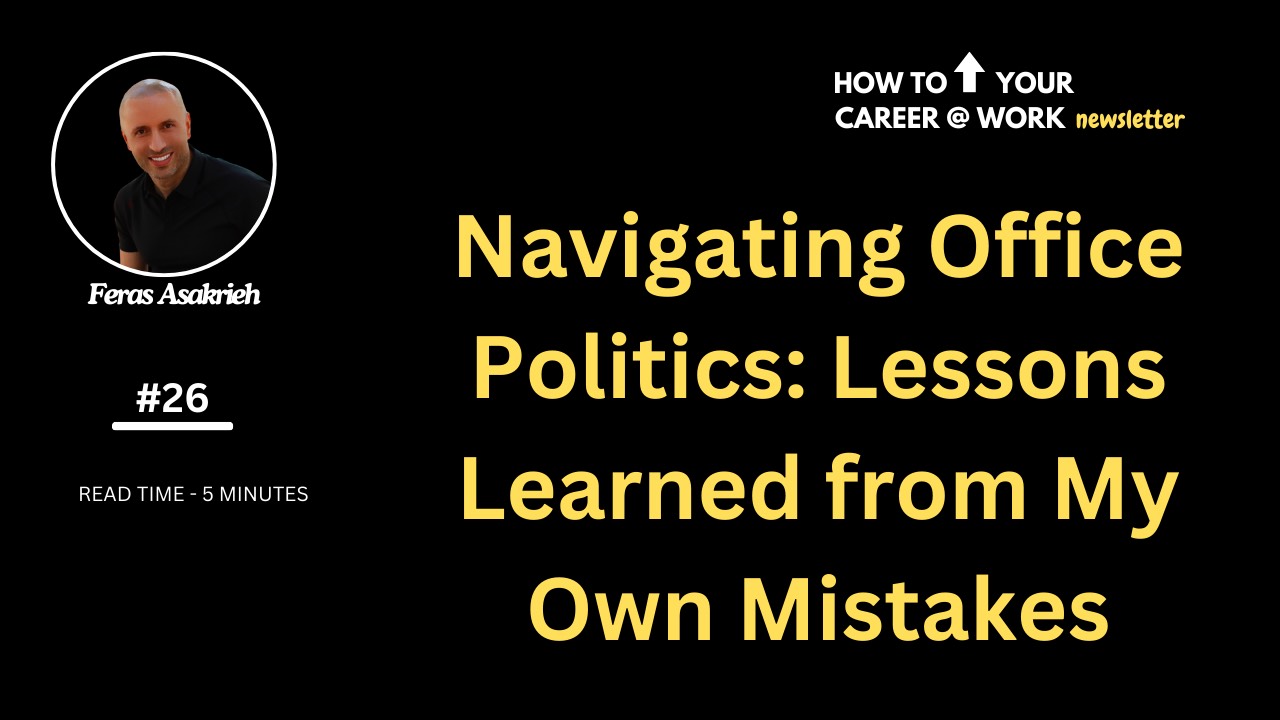
Navigating Office Politics: Lessons Learned from My Own Mistakes
READING TIME - 5 MINUTES
Office politics is something many of us dread.
It can feel like a minefield—full of unspoken rules, hidden agendas, and power dynamics that can be difficult to navigate.
But if you want to grow in your career, learning to lead effectively through these challenges is essential.
Today, I’m going to share with you some lessons I’ve learned from my own experience with office politics and how you can use these insights to navigate the workplace more confidently.
Why Office Politics Matter
Whether we like it or not, office politics is part of almost every workplace.
It’s not just about backroom deals or hidden conversations—it's also about building relationships, influencing decisions, and advancing your career in a way that’s aligned with your values.
Ignoring office politics altogether can leave you sidelined or overlooked, while learning how to play the game effectively and ethically can open doors you never knew existed.
I used to think that staying away from office politics was the best strategy—just keep your head down and focus on doing great work.
But that’s not always enough.
I’ve had to learn, sometimes the hard way, that leading through office politics is about knowing when to lean in, when to listen, and how to align your efforts to achieve not only personal goals but the goals of your team as well.
Here are the key lessons I’ve learned about leading through office politics.
Lesson 1: Build Relationships Before You Need Them
The biggest lesson I’ve learned about office politics is that relationships are everything.
Often, we think about networking only when we need something—a favor, information, or support for a project.
But building genuine relationships over time makes all the difference.
Relationships founded on trust allow you to navigate office politics effectively without coming across as transactional.
One of my career mentors once told me, "People will work with you and for you because they like you, not just because you’re good at what you do."
It took me years to understand the truth of that statement.
When I started investing time in getting to know my colleagues beyond the work itself—learning about their goals, supporting their projects, and just having real conversations—things started to change.
I found allies who were willing to advocate for me when it mattered most.
Lesson 2: Understand the Motivations of Others
Office politics often boils down to understanding the motivations of those around you.
People’s actions are almost always driven by their goals, fears, or desires for recognition.
Taking the time to understand what drives the people you work with—especially those in positions of power—will help you navigate political situations more effectively.
For example, I once worked on a cross-functional project where a senior leader kept rejecting our proposals.
It was frustrating—it felt like no matter what we did, it wasn't enough.
Eventually, I realized their main concern wasn’t the quality of our ideas; it was that they needed to show their own leadership they were managing risks effectively.
Once I addressed their need for reassurance—emphasizing the risk mitigation steps we were taking—the roadblocks started to disappear.
Lesson 3: Stay True to Your Values
Navigating office politics can feel like you’re losing a part of yourself if you’re not careful.
It’s easy to get caught up in what other people are doing and feel pressured to play by their rules, even if those rules go against your values.
But staying true to your values is what will ultimately set you apart and build long-term credibility.
I learned this lesson the hard way when I took part in a project that was, to be honest, more about showing off our department's work than actually creating value for the company.
I knew it wasn’t the right focus, but I went along with it anyway.
That experience left me feeling disconnected and frustrated—and it taught me that compromising my values wasn't worth it. Since then, I've made it a point to lead with integrity, even if that means speaking up or pushing back.
It’s not always easy, but the respect I’ve gained from those moments has been worth it.
Lesson 4: Be Strategic, Not Manipulative
A big misconception about office politics is that it’s all about manipulation. But the truth is, there’s a difference between being strategic and being manipulative.
Being strategic is about understanding what’s important to the company, the people, and your own career, and then aligning your efforts accordingly.
One practical strategy I use is to stay aware of what matters most to senior leadership.
What initiatives are they pushing? What keeps them up at night?
When you align your work to support the company's broader goals, you’re playing the political game in a way that benefits everyone—and positions yourself as someone who understands the bigger picture.
Leading through office politics is about relationships, understanding motivations, staying true to yourself, and being strategic without compromising your integrity.
These lessons have not only helped me navigate the complexities of corporate life but have also allowed me to grow as a leader.
Remember, office politics don’t have to be a dirty game—when approached with authenticity and care, it can be a powerful way to create opportunities for yourself and your team.
The key is to play the game on your terms, with your values intact, and to never lose sight of what truly matters to you.